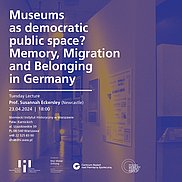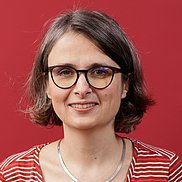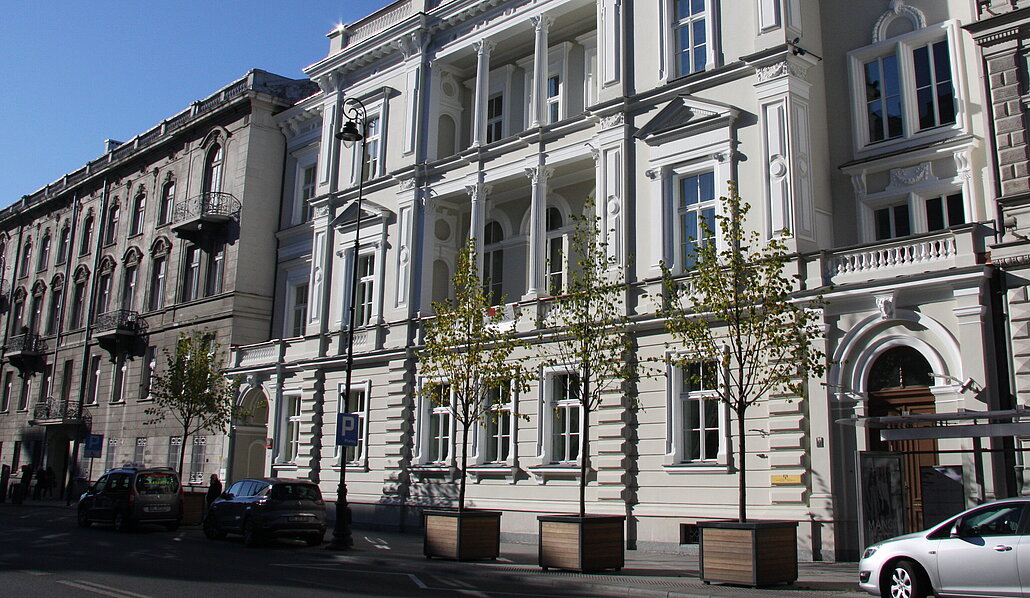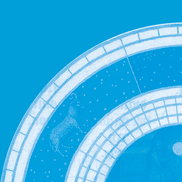
About
Dr. des. Izabela Paszko is a graduate of the Institute of Ethnology and Cultural Anthropology at the Jagiellonian University in Krakow, where in 2016 she defended her master's thesis on the mythologisation of the space of the Triangle of the Three Emperors on postcards from the 19th and early 20th centuries. In 2016, she also completed the postgraduate course 'Academy of Heritage' organised by the University of Economics in Krakow and the International Cultural Centre. Between 2020 and 2023, she was a doctoral student at the Ludwig and Maximilian University of Munich. Her doctoral defence took place in November 2023. She worked as a researcher at the Institute for Contemporary History Munich-Berlin in Munich in the INFOCOM project („Man hört, man spricht“ Informal Communication and Information „From Below“ in Nazi Europe) from 2020 to 2023. In August 2023, she started her work as a guide at the NS Documentation Centre in Munich. Since January 2024, she is working as a researcher (post doc) at the German Historical Institute Warsaw.
Research Interests
- Regional and cross-border history
- Museums and exhibitions
- Anthropology of everyday life
- Social history
- Politics of remembrance
Publications
Aufsätze
Wybrane aspekty gospodarowania poindustrialnym dziedzictwem. Współczesne konteksty i rozwiązania, in: Marek Świdrak, Michał Wiśniewsk (Hg.): "Akademia Dziedzictwa 2014-2020. Przegląd problemów badawczych z zakresu zarządzania i ochrony dziedzictwa kulturowego w Polsce", Międzynarodowe Centrum Kultury, Kraków 2023, 403-423.
Amateur Occupation-period Songs in the Context of Informal Communication in the Dąbrowa Basin: A New Research Perspective, in: Knut Holtsträter (Hrsg.) Lied und populäre Kultur / Song and Popular Culture, Jahrbuch des Zentrums für Populäre Kultur und Musik, 67. Jahrgang – 2022, 195-220.
Blogbeitrag “Doing History in Public”, Private Rumours as a Public Sphere in Nazi-Occupied Poland https://doinghistoryinpublic.org/2022/10/04/private-rumours-as-a-public-sphere-under-nazi-occupied-poland/
Z Archiwum Instytutu Zachodniego, nr 31/2021: „Aktion Saybusch w obiektywie Józefa Macikowskiego”, https://www.iz.poznan.pl/publikacje/z-archiwum-instytutu-zachodniego/z-archiwum-instytutu-zachodniego-nr-31-2021-aktion-saybusch-w-obiektywie-jozefa-macikowskiego
Biuletyn Instytutu Zachodniego, nr 25(480), 2021: Badania nad życiem codziennym pod okupacją w trakcie II wojny światowej: rekonesans badawczy, https://www.iz.poznan.pl/publikacje/biuletyn-instytutu-zachodniego/biz-nr-25480-badania-nad-zyciem-codziennym-pod-okupacja-w-trakcie-ii-wojny-swiatowej-sans-badawczy
Lieder aus der Zeit der Amateurbeschäftigung im Kontext der informellen Kommunikation in Zagłębie Dąbrowskie - eine neue Forschungsperspektive (auf Polnisch), Rocznik Muzeum „Górnośląski Park Etnograficzny w Chorzowie” 2021, tom 9, 19-45.
Blogbeitrag, Transformations-Blog, The Sleep of Reason Produces … Rumours, 2021.
Er ist Fahrrad gefahren - er ist Rad gefahren - problematische Beziehungen zwischen Schlesien und Zagłębie, in: „Barbarzyńca“ nr. 1 (22) 2016/2017, auf Polnisch, 2020, URL: http://www.barbarzynca.org/archiwum?issue=1507
Moderne Augengeschichten: Das 20. Jahrhundert denkt über den Sichtsinn und seine Folgen nach, in: „Szok Kulturowy“ 2015, auf Polnisch, URL: https://etnologia.uj.edu.pl/documents/11497829/529c0ff6-89de-419f-bce9-72acadece124
Latest news
Apr

Canceled: Prof. Susannah Eckersley (Newcastle): Museums as democratic public space? Memory, Migration and Belonging in Germany (Kopie 1)
We regret to inform you that the lecture by Prof. Susannah Eckersley (Newcastle)…
Apr

Magdalena Saryusz-Wolska ist neue Direktorin des Deutschen Historischen Instituts Warschau
Zum 1. April 2024 hat die Soziologin und Kulturwissenschaftlerin Magdalena…



